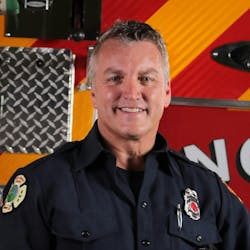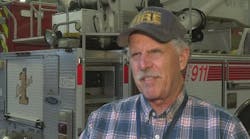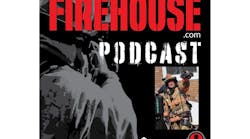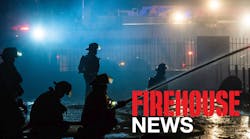I live in an urban area. The town has the typical response area for each of its stations, a typical population density, and a typical fire department station and staffing complement for an urban center that’s of its size. In fact, the town is so typical that, over the years, it has been used as a product testing ground for several global companies. Essentially, it’s a cross section of Everytown, USA.
I drive by one of this town’s fire stations continually. Friends live there. The beach where I swim, my gym, my eye doctor and where I walk my dog all are at that end of town. I drive by the station sometimes eight times per day—always during the daytime, by the way.
A few months ago, it occurred to me that the apparatus bay door always was closed when I drove by, despite the rig being in the bay. No one ever was in sight.
In the interest of being fair to the crew of the station, I kept considering reasons for what I saw, including, “They must’ve had a tough night of calls” and “They’re training inside” and “They must be training offsite” and “I just happen to be missing them.”
I started to mentally—and then literally—keep a tally of the times that I saw the bay door closed.
When I started to write this column, I stopped the tally at 100 drive-bys of the station. One hundred seemed like a good, round number.
There actually have been firefighter sightings: a captain standing by his right seat setting up his gear, a firefighter having a cigarette, another firefighter walking out to his truck.
Three out of 100 drive-bys when the bay door was open. That’s 3 percent. Not a great average.
Here’s what I didn’t see: anyone pulling hose, throwing ladders, washing the rig, having coffee on the front bumper as an invitation for passers-by to chat. No school tours. No station cleaning (inside or out). No one practicing donning/doffing SCBA.
I also didn’t see members opening and closing bay doors, climbing around the rig, reading hydrant maps on the cowling. So, not just an absence of general activity, but, more importantly, no training activity.
What I have seen is poor station care: chipped paint on the bay doors, the grass regularly uncut and weedy, the apron not washed down, the blinds that are in the front office that face the street damaged and unclean.
For the purposes of full disclosure, the department is in the process of building a new station at the same location of the current firehouse. However, not only has the new station been a decadeslong political volleyball, but the current station has been famously ramshackle for years, not just since the construction of the new firehouse started.
Impressions
In the end, old station or new, a firehouse belongs to the public that a department serves and should be treated as such. Not only should a station be a point of pride for every firefighter who works there, the station also should look inviting. A firehouse is more than just four walls and a roof.
It’s fair to say that the station that I pass frequently—and by extension, the department—adheres to a closed-door policy, which usually extends to a “black chair rules” policy, a “union drives all we do” policy and, possibly worst, a “the city isn’t taking care of us, so why should we take care of our house” policy. Each of these screams departmentwide complacency.
Is all of this hyperbole? Have I stretched the closed-door metaphor too far? Well, let me ask this: If you saw one of your local firefighters in an unkempt uniform and/or a dirty, mud-splattered rig driving your streets, what would that tell you about the department as a whole? The little things often reveal what’s really happening in an organization. So, yes, the closed door tells a bigger story.
Two dangers
Complacency kills. That isn’t hyperbole. If the bay door always is closed and if the rig or crew never is out in the air aside from the occasional call or meeting elsewhere, then the daily drills and training that are critical to be not just competent but proficient in this high-risk gig of ours aren’t happening either. That’s dangerous, period.
A closed-door policy can be dangerous culturally, too. It’s a shutting-out of the very people who we serve, the ones who we respond to and for, the ones who own the apparatus and who own the right to see our world in the firehouse. Culturally, the closed door can be an indicator that the station captain allows this and that those who are above him or her either allow it or don’t even notice. I’m not sure which is worse, except that both also are indicative of complacency at the top, which means the cultural issue is departmentwide.
Are these kinds of departments staffed by good people? I’d like to believe that they are. Are they staffed with solid firefighters? Are those members operationally sound? They probably were when they were hired, but by working in a selfish and by extension character-poor atmosphere where training isn’t the norm, I don’t see how they can be.
Really, to sum it all up, they’re not doing their damn job, which is take care of their rig, take care of their house, take care of their citizens by being tactically great.
Four immediate steps
What would a department that recognizes itself from reading this article do?
It must understand that moving away from complacency and toward a training-heavy policy is a cultural fix, which is a “turning of the ship” scenario that takes time and considerable effort. However, simple fixes can be applied right now to make an immediate difference.
First, hire the right people. Someone hired the captains and others who are in authority who allow this complacency. Begin at the beginning. During the next hiring, start to fill your ranks with the kind of recruits who won’t follow their superiors too easily.
Second, start to enforce the department’s policies and standard operating procedures. I’m sure that they’re sitting in a binder somewhere on a shelf. The power of the printed word can’t be underestimated. If there are any questions about how, when and what training should be done, point to the binder. Don’t have the policy? Write it.
Third, reach for any book on leadership. Somewhere in the table of contents there likely is a chapter on leading by example. Grab your gear, head to a station and ask the crew to throw ladders with you or wash a rig for them—but outside for the public to see. Buy crew members a coffee and walk the streets that are close to the station. All of you will be seen, and it’ll be a great opportunity for them to see their first-in district from street level. On the walk, talk building construction, forcible entry, issues with rig placement at certain addresses, etc. Just lead by example, which usually means getting out there in front of your crew and showing the members how it’s done.
My final suggestion is another take on leading by example: If you’re a chief or station captain, understand the power of coffee. Show up at shift start, order a front bumper meeting, grab a mug and open the damn bay door. Sit there and solve the world’s problems. Talk sports. Talk Ford vs. Chevy. Talk about how bad the coffee is. Take the lead and wave at drivers who pass by. Mostly, though, listen. The complacency is happening for a reason, maybe several. One of the most common reasons is crew members not feeling heard or, more accurately, that they don’t believe that they matter. So, hear them. It is, indeed, that simple. Are you a firefighter? Fine, don’t order the bumper meet, but do the rest.
From unusual to natural
It might take time. It might feel forced at first. Some will jump on board sooner than others. However, eventually, the embracing of revealing the mistakes that are made in training, that your firehouse isn’t pretty or perfect, that you’re tired and just don’t feel like engaging with the public will become natural. The morning meet will become a part of shift change, and your training will be something that you’ll want citizens to see, because you’ll be that much better at it.
Eventually, opening the bay door will open up so much more.






